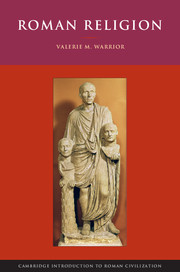Book contents
- Frontmatter
- Contents
- List of Illustrations and Maps
- Preface
- Acknowledgments
- 1 The Gods and their Worship
- 2 Divination, Prayer, and Sacrifice
- 3 Religion and the Family
- 4 Religion and the State
- 5 Religion and War
- 6 The Calendar, Festivals, and Games
- 7 Official Attitudes toward Foreign Cults
- 8 Magic and the Occult
- 9 Becoming a God
- 10 The Jews and Christianity
- Chronology
- Maps
- Gods
- Glossary
- Ancient Sources
- Bibliography
- Illustration Credits
- Index
2 - Divination, Prayer, and Sacrifice
Published online by Cambridge University Press: 05 February 2015
- Frontmatter
- Contents
- List of Illustrations and Maps
- Preface
- Acknowledgments
- 1 The Gods and their Worship
- 2 Divination, Prayer, and Sacrifice
- 3 Religion and the Family
- 4 Religion and the State
- 5 Religion and War
- 6 The Calendar, Festivals, and Games
- 7 Official Attitudes toward Foreign Cults
- 8 Magic and the Occult
- 9 Becoming a God
- 10 The Jews and Christianity
- Chronology
- Maps
- Gods
- Glossary
- Ancient Sources
- Bibliography
- Illustration Credits
- Index
Summary
The whole religious practice (religio) of the Roman people is divided into ritual (sacra), auspices (auspicia), and prophetic warnings…. I have always thought that none of these areas of religion are to be despised, since I am convinced that Romulus by his auspices and Numa by his establishment of ritual laid the foundations of our state, which assuredly could never have been as great as it is had we not maintained the fullest measure of divine favor.
(Cicero, On the Nature of the Gods 3.5)More than one kind of divination is used in public and in private. To say nothing of other peoples, how many kinds have our own people embraced! Initially, according to tradition, Romulus, the father of this city, not only founded it with due auspices, but he himself was an excellent augur. Then other kings used other augurs and, after the expulsion of the kings, no public business was ever transacted at home or abroad without first taking the auspices.
(Cicero, On Divination 1.3)As these excerpts from Cicero indicate, tradition retrojected Rome's religious institutions back to her mythical past, attributing the institution of the auspices and divination to Rome's founder, Romulus, and the establishment of ritual to Numa, Romulus' successor as king. The poet Ovid (43 BCE–17 CE) tells how Romulus and his brother Remus took the auspices to decide which of them should be the founder of Rome.
- Type
- Chapter
- Information
- Roman Religion , pp. 15 - 26Publisher: Cambridge University PressPrint publication year: 2006



